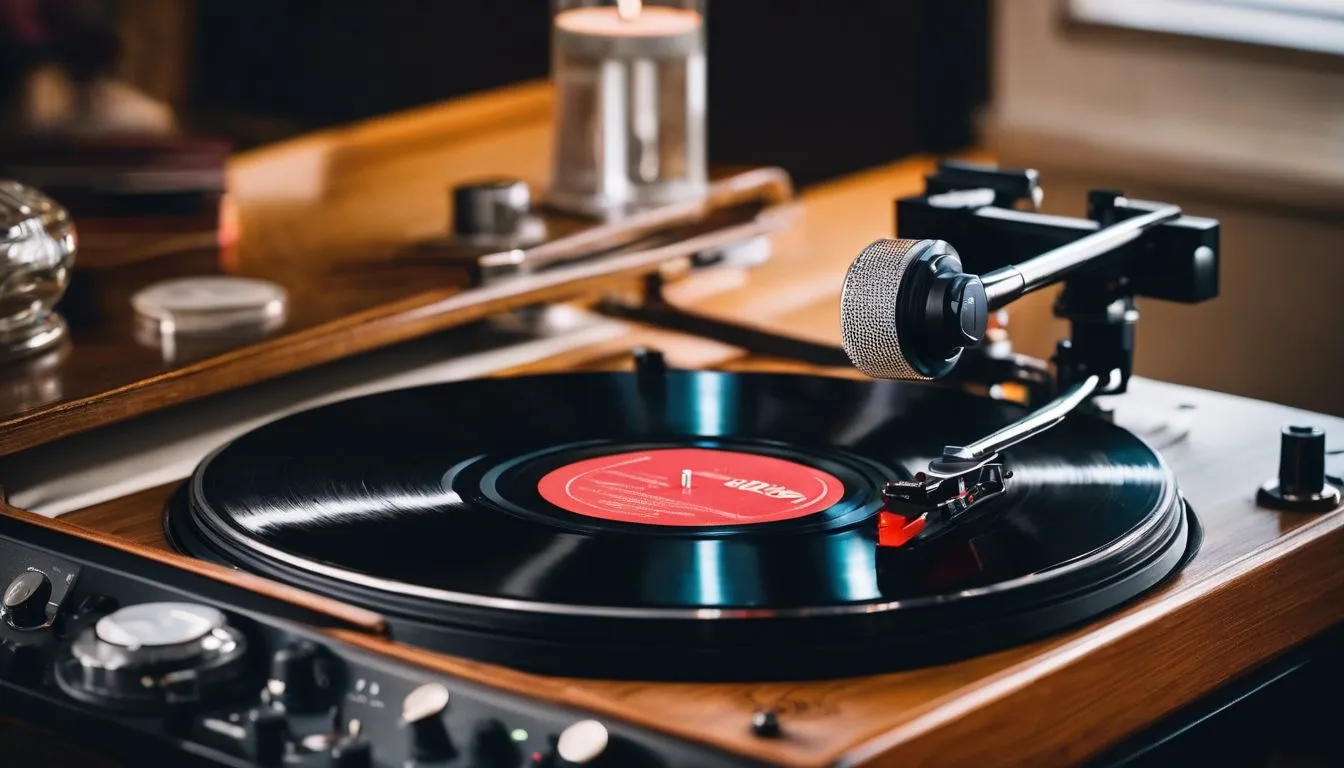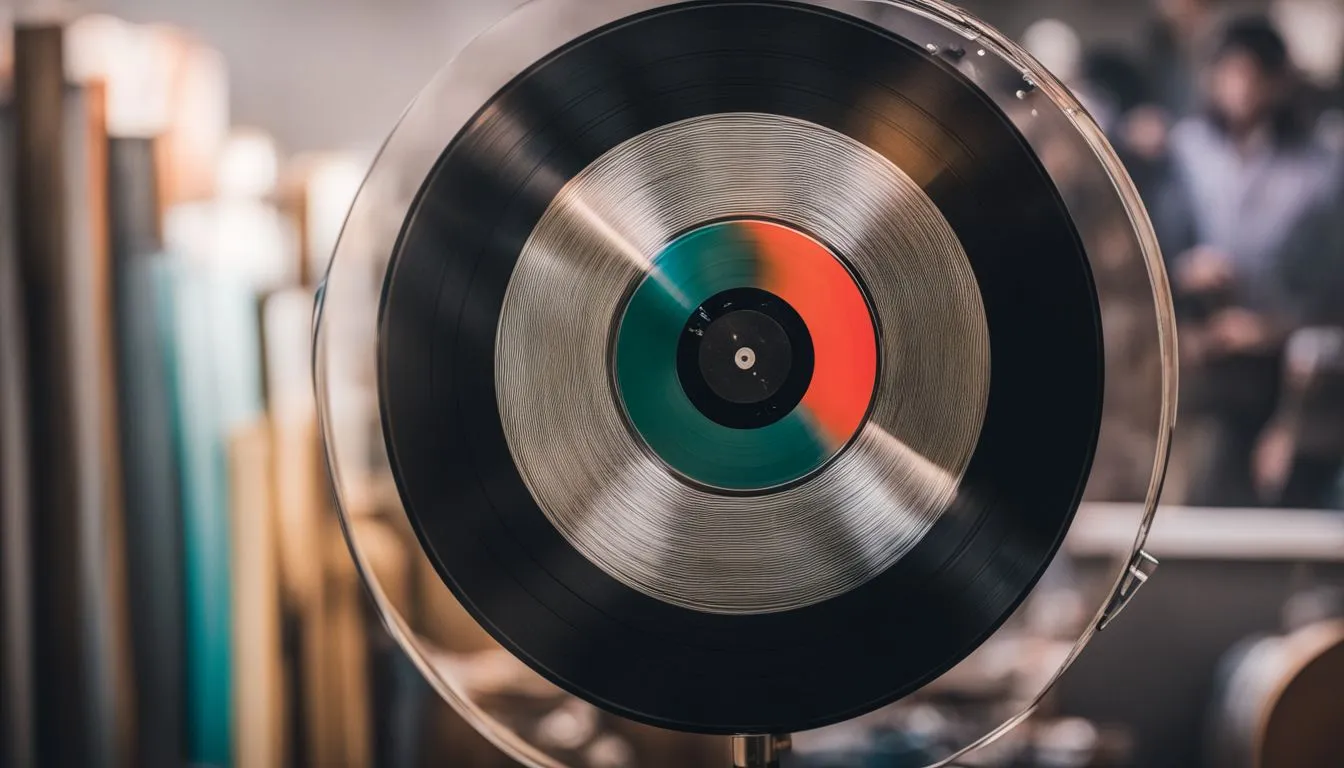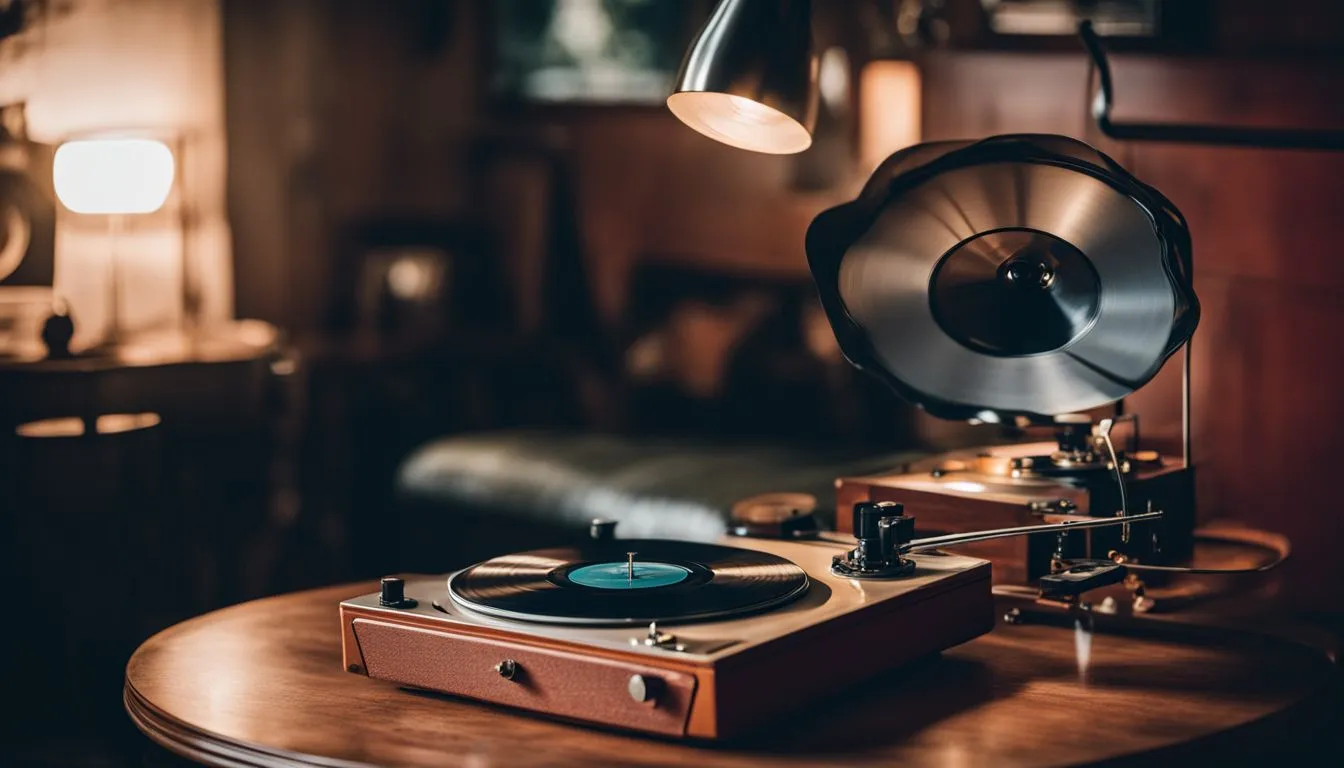Have you ever been grooving to your favorite vinyl record when, out of nowhere, it starts stuttering on the same note? Frustrating, right? It’s a common issue known as record repeating or skipping, and there’s good news: this guide is packed with easy fixes to get your tunes spinning smoothly again.
Let’s crack the case of the looping vinyl! Keep reading for tips that’ll bring harmony back to your turntable.
Key Takeaways
- Dust and dirt on records cause the needle to skip, repeating parts of the song. Clean your vinyl with a brush and solution before playing.
- Scratches or damage to your record will make the music loop back. Handle them gently, and check for scratches often.
- An unbalanced tonearm makes records skip or repeat. Adjust the counterweight correctly to fix this issue.
- A stable location for your turntable prevents skipping due to vibrations. Use heavy tables or special stands that absorb shocks.
- Leaving records out can attract dust, harming sound quality over time. Store them in sleeves and keep them upright away from dust after use.
Understanding Record Looping or Skipping
Record looping or skipping is when your vinyl records don’t play smoothly. It happens if the stylus, also known as the needle, jumps out of the groove on your record. The grooves are like a path for the stylus to follow.
When it jumps or skips, you hear parts of songs repeat or sections get missed.
There are several reasons why this might happen. Things like dust, grime, and even small hairs can block the path in these grooves. This makes it tough for the needle to stay on track.
Sometimes, if a record has been played a lot or handled roughly, it can get scratched up; these scratches act like bumps in the road that toss the stylus around.
Your turntable setup can also be part of the problem. If your tonearm isn’t balanced just right with proper tracking force, it won’t hold onto those grooves well enough to prevent skipping.
Fixing these issues takes patience and care, but it starts with knowing what’s causing trouble for your tunes—it’s all about spotting where things go off track so you can make them right again.
Now let’s look at some common causes behind why records repeat their sound unexpectedly.
https://www.youtube.com/watch?v=Jq9kUQsV7cQ
Causes of Record Repeating
It’s incredibly frustrating when you’re ready to enjoy your favorite tune, but the record just keeps looping back on itself. Let’s dive into the nitty-gritty of why this happens—it could be anything from a speck of dust throwing off your groove to an uncalibrated tonearm that needs a bit more finesse.
Dust and dirt
Dust and dirt are big troublemakers for record players. If your vinyl looks dirty, that grime might make the stylus jump right out of the groove. Think of it like a tiny obstacle course where the needle keeps tripping over dirt clumps.
This mess can cause your music to repeat itself or skip parts altogether. Over time, playing filthy records wears down your stylus faster.
Keep those tunes clear by giving your records a gentle wipe with a microfiber cloth before each play. For tougher grime, use a carbon-fiber brush specifically designed for cleaning vinyl.
This isn’t just about sound quality; it’s also turntable maintenance 101! A clean record is less likely to damage the delicate needle on its journey around the grooves, making sure every beat hits home without a hitch.
Damaged or scratched records
Scratches and warps on records can be real trouble. They mess up the sound and make your record skip or repeat parts of a song. Think of a scratch like a roadblock for the needle—it hits that spot and keeps looping back instead of moving forward.
If you’ve got an old favorite that’s been through too much, it might start acting up because it’s damaged.
Even tiny scratches can cause big problems. Your turntable’s needle, also called a stylus, has to glide smoothly in the grooves to play music. When it falls into a scratch, the track gets thrown off course.
To keep your tunes playing smoothly, treat your records with care and check them for damage before you drop the needle.
Unbalanced Tonearm and Counterweight
Moving past scratches, another culprit for a record that keeps looping could be the tonearm of your turntable. It needs to balance just right. If it’s not, you’ll likely hear parts of your music repeat over and over—or skip entirely.
The unbalanced tonearm floats above or gets pushed into the record too hard; both scenarios mess with your tunes.
Adjusting the counterweight at the end of your tonearm is crucial. Get this step right, and you’re on track to smooth playing records. A quick tip: aim for a tracking adjustment around 3.5 or lower; this can help keep things steady.
Correctly balancing these elements prevents that annoying jump in the song where no one wants it—stuck in an endless loop!
Unstable Location or Excessive Vibration Interference
Just as an unbalanced tonearm can cause trouble, so can vibrations around your turntable. Your record player might repeat if it’s sitting in an unstable spot. Floors that bounce or tables that wobble send shocks to the player.
These jolts can make the needle jump and skip.
Vibrations come from many places. Speakers too close to your turntable are common culprits. Even footsteps or closing doors might disturb play. Use isolation platters or speaker isolation tactics to keep the music smooth.
Make sure old players have good vibration dampeners to avoid repeats and skips.
How to Fix a Looping Record?
Solving the mystery of a looping record isn’t just about spinning vinyl and hoping for the best—there’s a bit of detective work involved. From embracing the art of cleaning to tweaking your tonearm, getting your tunes back on track is all in a day’s turntable troubleshooting.
Cleaning Techniques
Dirt on your records can make them skip. Keeping them clean is key to enjoying their sound.
- Start by getting a quality record cleaning kit. These kits usually come with a brush, cleaning solution, and cloth.
- Gently place the brush on the record as it spins. This will pick up dust from the grooves.
- Apply a few drops of the cleaning solution to the brush or directly onto the vinyl. Avoid soaking it.
- Wipe in a circular motion, following the grooves. Be patient, and don’t press too hard.
- Dry the record with a soft, lint-free cloth. Make sure it’s completely dry before playing it again.
- Regularly clean your stylus with a purpose-made tool. This helps prevent dirt buildup that causes skipping.
- Replace your stylus after 800–1000 hours of play to maintain good sound and avoid damage.
Balancing the Tonearm
Balancing the tonearm is key to a smooth listening experience. It helps prevent your records from skipping or repeating.
- Check your turntable’s manual first. Each model has its own way to balance the tonearms.
- Turn off the turntable. You don’t want it to spin while you make adjustments.
- Find the tone-arm balance. This is usually a sliding weight on the back of the tongue.
- Set the counterweight. Gently rotate it until the tonearm floats horizontally without touching anything.
- Use a tracking force gauge, if available. This helps set the exact force needed for your record player.
- Carefully dial in the recommended tracking force by turning the counterweight according to your manual’s guidelines.
- Test the balance after adjustments. Play a record to see if there’s an improvement in performance.
- Look for even movement of the tonearm. Watch how it glides across your record; it shouldn’t wobble or jump.
Choosing a secure location
Find a sturdy place for your record player to avoid skips. It should be somewhere that doesn’t shake or get hit often. A heavy table, shelf, or special stand that can handle vibrations will make a big difference.
This helps keep your music smooth without repeats.
Next, think about whether you should leave the record on the turntable after listening. To keep your tunes in top shape, let’s talk about proper record care and storage!
Should You Leave a Record on the Turntable?
Leaving a record on the turntable might seem like no big deal, but it’s not the best idea. Over time, dust and dirt can settle on the vinyl and into the grooves. This grime affects sound quality and increases wear on both your record and stylus.
Think of it this way: each speck of dust is like a tiny obstacle course for your needle to trip over.
Instead, store your records properly after playing them. Slip them into their sleeves, ideally anti-static ones, and keep them upright in a cool, dry place. Your records are treasures; treat them with care! Even if you’re eager to listen again soon or show off your favorite album cover as art, remember that taking these extra steps will keep your tunes spinning flawlessly for years to come.
Conclusion
Records can be tricky, but you’ve got this! When your vinyl starts repeating, remember that it’s often something simple like dust or a need for balance adjustment. Keep the turntable steady, and take care of your records with regular cleaning.
With these tips, kick back and enjoy the music as it spins smoothly—no more annoying skips!
FAQs
1. What causes my record to keep skipping?
If your record keeps skipping, it might be because of dust on the vinyl or a problem with your turntable’s needle. Make sure everything is clean, and check if the needle needs replacing.
2. Can my mixer cause records to repeat?
Absolutely! A faulty mixer can lead to repeating issues. It could be sending incorrect signals to your record player. Check your mixer settings or consult the manual for troubleshooting.
3. Are there any affiliate programs related to fixing record players?
Sure thing: the Amazon Services LLC Associates Program is an affiliate advertising program designed for sites to earn by linking products from amazon.com, including those that can help fix a repeating record.
4. How do I prevent my record from skipping in the future?
To avoid skips, keep your records and players clean, handle them carefully and make sure your equipment is well-maintained. Regular checks can save you a lot of trouble down the line!


